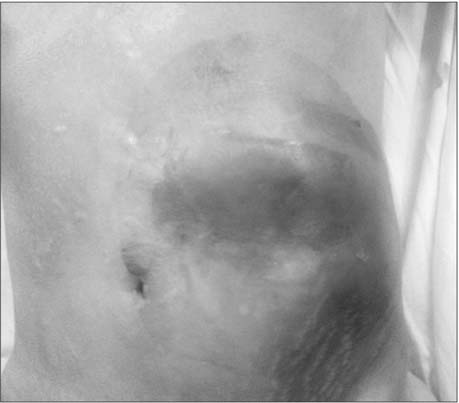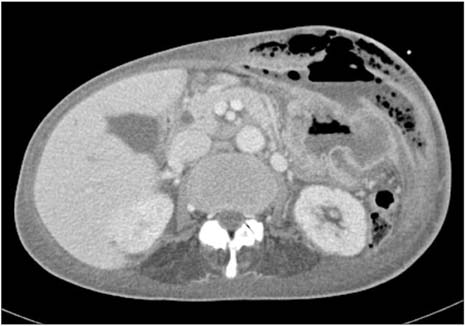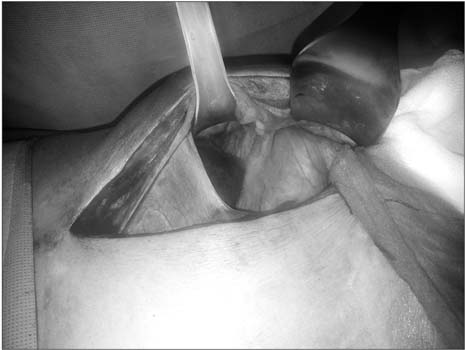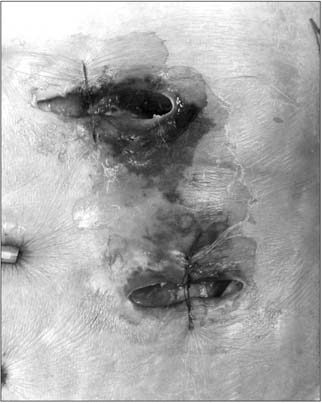J Gastric Cancer.
2015 Sep;15(3):214-217. 10.5230/jgc.2015.15.3.214.
Advanced Gastric Cancer Perforation Mimicking Abdominal Wall Abscess
- Affiliations
-
- 1Department of Surgery, Bucheon St. Mary's Hospital, College of Medicine, The Catholic University of Korea, Bucheon, Korea. surgeryjun@catholic.ac.kr
- KMID: 2372208
- DOI: http://doi.org/10.5230/jgc.2015.15.3.214
Abstract
- Surgeons occasionally encounter a patient with a gastric cancer invading an adjacent organ, such as the pancreas, liver, or transverse colon. Although there is no established guideline for treatment of invasive gastric cancer, combined resection with radical gastrectomy is conventionally performed for curative purposes. We recently treated a patient with a large gastric cancer invading the abdominal wall, which was initially diagnosed as a simple abdominal wall abscess. Computed tomography showed that an abscess had formed adjacent to the greater curvature of the stomach. During surgery, we made an incision on the abdominal wall to drain the abscess, and performed curative total gastrectomy with partial excision of the involved abdominal wall. The patient received intensive treatment and wound management postoperatively with no surgery-related adverse events. However, the patient could not receive adjuvant chemotherapy and expired on the 82nd postoperative day.
Keyword
MeSH Terms
Figure
Reference
-
1. Mahvi DM, Krantz SB. Stomach. In : Mahvi DM, Krantz SB, Townsend CM, Beauchamp RD, Evers BM, Mattox KL, editors. Sabiston textbook of surgery. Philadelphia: Elselvier Saunders;2012. p. 1217.2. Bonenkamp JJ, Songun I, Hermans J, Sasako M, Welvaart K, Plukker JT, et al. Randomised comparison of morbidity after D1 and D2 dissection for gastric cancer in 996 Dutch patients. Lancet. 1995; 345:745–748.3. Cuschieri A, Weeden S, Fielding J, Bancewicz J, Craven J, Joypaul V, et al. Patient survival after D1 and D2 resections for gastric cancer: long-term results of the MRC randomized surgical trial. Br J Cancer. 1999; 79:1522–1530.4. Martin RC 2nd, Jaques DP, Brennan MF, Karpeh M. Extended local resection for advanced gastric cancer: increased survival versus increased morbidity. Ann Surg. 2002; 236:159–165.5. Jwo SC, Chien RN, Chao TC, Chen HY, Lin CY. Clinicopathological features, surgical management, and disease outcome of perforated gastric cancer. J Surg Oncol. 2005; 91:219–225.6. Heimlich HJ. The treatment of perforated cancer of the stomach. Am J Gastroenterol. 1963; 39:243–251.7. Kasakura Y, Ajani JA, Fujii M, Mochizuki F, Takayama T. Management of perforated gastric carcinoma: a report of 16 cases and review of world literature. Am Surg. 2002; 68:434–440.8. Kasakura Y, Ajani JA, Mochizuki F, Morishita Y, Fujii M, Takayama T. Outcomes after emergency surgery for gastric perforation or severe bleeding in patients with gastric cancer. J Surg Oncol. 2002; 80:181–185.9. Mahar AL, Coburn NG, Singh S, Law C, Helyer LK. A systematic review of surgery for non-curative gastric cancer. Gastric Cancer. 2012; 15:Suppl 1. S125–S137.10. Bonenkamp JJ, Songun I, Hermans J, van de Velde CJ. Prognostic value of positive cytology findings from abdominal washings in patients with gastric cancer. Br J Surg. 1996; 83:672–674.
- Full Text Links
- Actions
-
Cited
- CITED
-
- Close
- Share
- Similar articles
-
- A Case of Abdominal Abscess Mimicking a Tumor Caused by a Perforated Gastric Ulcer
- A Case of Subcapsular Liver Abscess Secondary to Perforating Ulcer of Gastric Cancer
- Intraabdominal abscess mimicking gastric cancer recurrence: a case report
- A Giant Gastric Perforation Occurring in the Normal Mucosa during Endoscopy in a Patient with Advanced Gastric Cancer
- A Case of Intramural Gastric Wall Abscess, a Rare Disease Successfully Treated with Endoscopic Incision and Drainage






